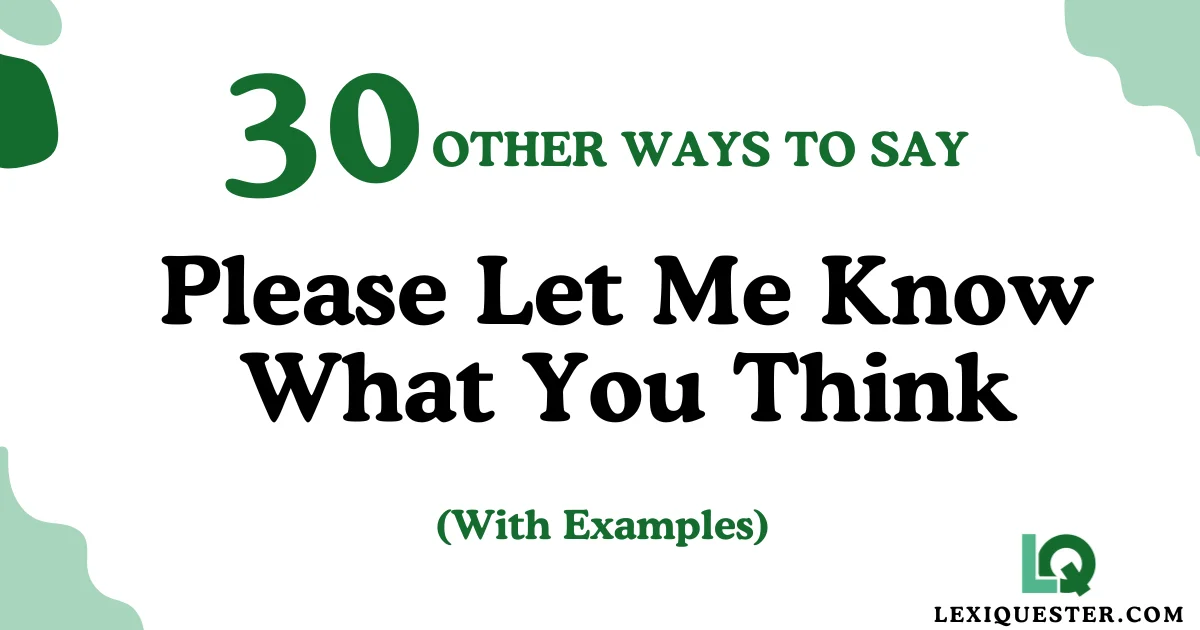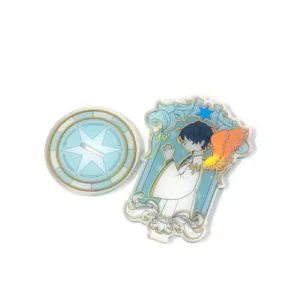Effective communication is all about connection, and finding the right words to express your thoughts can create an inviting atmosphere for feedback. Instead of the standard phrase, “Please let me know what you think,” consider these 30 warm and engaging alternatives.
These phrases not only convey your request for feedback but also foster a sense of collaboration and openness.
What Does “Please Let Me Know What You Think” Mean?
The phrase “Please let me know what you think” is commonly used to invite feedback or opinions on a particular topic, idea, or piece of work.
It signals to the recipient that their thoughts are valued and that you are open to discussion or critique.
When to Use “Please Let Me Know What You Think”
This phrase is typically used in various contexts, such as requesting feedback on a proposal, seeking opinions on a new idea, or inviting comments on a draft. It can be appropriate in professional emails, team meetings, or casual conversations where collaboration and input are encouraged.
Is It Professional/Polite to Say “Please Let Me Know What You Think”?
Yes, “Please let me know what you think” is both professional and polite. However, using alternative phrases can add warmth and personality to your request, making it more engaging and encouraging for the recipient to share their thoughts.
Please Let Me Know What You Think Synonym:
- I’d Love to Hear Your Thoughts
- What Are Your Impressions?
- I’m Eager for Your Feedback
- Please Share Your Insights
- I’d Appreciate Your Opinion
- What Do You Think About This?
- I’m Curious to Know Your Take
- How Do You Feel About This?
- Your Thoughts Would Be Greatly Valued
- I Welcome Your Feedback
- Feel Free to Share Your Thoughts
- Let Me Know How You See It
- I’d Love Your Perspective
- What’s Your Take on This?
- Please Let Me Know Your Thoughts
- I Would Love to Know Your Thoughts
- I’m Interested in Your Feedback
- What Do You Think So Far?
- Your Thoughts Are Important to Me
- I’m Open to Your Suggestions
- How Does This Sound to You?
- Please Give Me Your Thoughts
- I Value Your Opinion
- I’m Looking Forward to Your Feedback
- Please Let Me Know What You Think
- Your Input Would Be Appreciated
- I Would Welcome Your Thoughts
- Let Me Know If You Have Any Thoughts
- I’m Here for Your Thoughts
- What’s Your Opinion on This?
1. I’d Love to Hear Your Thoughts
Meaning: You genuinely want the recipient’s opinion
Explanation: This phrase conveys enthusiasm and interest in the recipient’s perspective.
Example: “I’d love to hear your thoughts on the new marketing strategy.”
Tone: Friendly and inviting
2. What Are Your Impressions?
Meaning: Seeking initial reactions or feelings about something
Explanation: This phrase encourages a more casual sharing of thoughts.
Example: “What are your impressions of the draft report?”
Tone: Casual and approachable
3. I’m Eager for Your Feedback
Meaning: Expresses anticipation for the recipient’s input
Explanation: This shows that you value their opinion and are looking forward to it.
Example: “I’m eager for your feedback on the presentation.”
Tone: Enthusiastic and engaged
4. Please Share Your Insights
Meaning: Encouraging the recipient to provide their expert opinions
Explanation: This phrase invites thoughtful reflection from the recipient.
Example: “Please share your insights on the proposed changes.”
Tone: Professional and respectful
5. I’d Appreciate Your Opinion
Meaning: You value the recipient’s viewpoint and would like to hear it
Explanation: This phrase conveys respect for the recipient’s expertise or experience.
Example: “I’d appreciate your opinion on this matter.”
Tone: Polite and appreciative
6. What Do You Think About This?
Meaning: A direct way to invite the recipient’s thoughts
Explanation: This straightforward phrase invites open discussion.
Example: “What do you think about this new initiative?”
Tone: Direct and conversational
7. I’m Curious to Know Your Take
Meaning: You are interested in the recipient’s perspective
Explanation: Adds a sense of intrigue and invites the recipient to share their views.
Example: “I’m curious to know your take on the proposed timeline.”
Tone: Friendly and informal
8. How Do You Feel About This?
Meaning: Asking for the emotional response to something
Explanation: This phrase invites a personal connection and encourages deeper feedback.
Example: “How do you feel about the new design concept?”
Tone: Warm and engaging
9. Your Thoughts Would Be Greatly Valued
Meaning: Emphasizing the importance of the recipient’s input
Explanation: Shows that their opinions are appreciated and significant.
Example: “Your thoughts would be greatly valued on this project.”
Tone: Respectful and appreciative
10. I Welcome Your Feedback
Meaning: Open to receiving the recipient’s opinions or critiques
Explanation: This phrase encourages a collaborative approach.
Example: “I welcome your feedback on the budget proposal.”
Tone: Friendly and open
11. Feel Free to Share Your Thoughts
Meaning: Inviting the recipient to express their opinions freely
Explanation: A casual way to indicate that all feedback is welcome.
Example: “Feel free to share your thoughts on the new process.”
Tone: Informal and inviting
12. Let Me Know How You See It
Meaning: Requesting the recipient’s perspective on a situation
Explanation: This phrase encourages the recipient to provide their viewpoint.
Example: “Let me know how you see it regarding the timeline.”
Tone: Casual and engaging
13. I’d Love Your Perspective
Meaning: Expressing a desire to hear the recipient’s unique viewpoint
Explanation: This phrase acknowledges the recipient’s insights.
Example: “I’d love your perspective on the marketing plan.”
Tone: Warm and respectful
14. What’s Your Take on This?
Meaning: Asking for the recipient’s opinion
Explanation: A conversational way to invite thoughts and feedback.
Example: “What’s your take on the changes we discussed?”
Tone: Casual and friendly
15. Please Let Me Know Your Thoughts
Meaning: A direct invitation for the recipient’s feedback
Explanation: This phrase retains formality while requesting input.
Example: “Please let me know your thoughts on the new policy.”
Tone: Professional and polite
16. I Would Love to Know Your Thoughts
Meaning: Expressing enthusiasm for the recipient’s feedback
Explanation: A warm way to show you value their opinion.
Example: “I would love to know your thoughts on the project outcome.”
Tone: Engaging and friendly
17. I’m Interested in Your Feedback
Meaning: Showing curiosity about the recipient’s opinions
Explanation: Indicates that you value their perspective.
Example: “I’m interested in your feedback regarding the new software.”
Tone: Open and respectful
18. What Do You Think So Far?
Meaning: Seeking feedback on progress or initial thoughts
Explanation: This phrase invites ongoing dialogue and discussion.
Example: “What do you think so far about the new initiative?”
Tone: Casual and conversational
19. Your Thoughts Are Important to Me
Meaning: Emphasizing the value of the recipient’s feedback
Explanation: A heartfelt way to convey appreciation for their input.
Example: “Your thoughts are important to me as we finalize this plan.”
Tone: Sincere and respectful
20. I’m Open to Your Suggestions
Meaning: Indicating a willingness to receive advice or ideas
Explanation: This phrase fosters a collaborative atmosphere.
Example: “I’m open to your suggestions on how we can improve.”
Tone: Collaborative and friendly
21. How Does This Sound to You?
Meaning: Asking for the recipient’s reaction to an idea
Explanation: This phrase encourages discussion about a specific proposal.
Example: “How does this sound to you for the upcoming meeting?”
Tone: Casual and engaging
22. Please Give Me Your Thoughts
Meaning: A straightforward request for feedback
Explanation: Direct but still courteous, this phrase invites discussion.
Example: “Please give me your thoughts on the new strategy.”
Tone: Professional and clear
23. I Value Your Opinion
Meaning: Expressing appreciation for the recipient’s insights
Explanation: This phrase underscores the importance of their feedback.
Example: “I value your opinion on this matter, so please share.”
Tone: Respectful and sincere
24. I’m Looking Forward to Your Feedback
Meaning: Expressing eagerness for the recipient’s response
Explanation: This phrase indicates that you are anticipating their thoughts.
Example: “I’m looking forward to your feedback on the proposal.”
Tone: Positive and engaged
25. Please Let Me Know What You Think
Meaning: A direct way to request feedback
Explanation: Maintains formality while inviting the recipient to share their opinions.
Example: “Please let me know what you think about the changes.”
Tone: Polite and professional
26. Your Input Would Be Appreciated
Meaning: Indicates that the recipient’s feedback is valued
Explanation: This phrase conveys respect and encourages collaboration.
Example: “Your input would be appreciated as we move forward.”
Tone: Respectful and inviting
27. I Would Welcome Your Thoughts
Meaning: Inviting the recipient’s opinions with warmth
Explanation: This phrase shows that you are open to hearing their ideas.
Example: “I would welcome your thoughts on the project plan.”
Tone: Warm and friendly
28. Let Me Know If You Have Any Thoughts
Meaning: Inviting feedback or questions
Explanation: This phrase creates a space for open communication.
Example: “Let me know if you have any thoughts on the meeting agenda.”
Tone: Casual and approachable
29. I’m Here for Your Thoughts
Meaning: Indicating availability for feedback
Explanation: This phrase shows that you are open to discussion.
Example: “I’m here for your thoughts whenever you’re ready.”
Tone: Casual and inviting
30. What’s Your Opinion on This?
Meaning: A direct request for feedback
Explanation: This straightforward phrase invites the recipient to share their perspective.
Example: “What’s your opinion on the proposed budget?”
Tone: Direct and professional
Conclusion
Finding the right words to invite feedback can make all the difference in fostering communication. By using these alternatives to “please let me know what you think,” you create an environment of openness and collaboration.
Whether you’re in a professional setting or a casual conversation, these phrases will help you express warmth and encourage meaningful dialogue.
Recent Posts
- 30 Other Ways to Say “Happy to Assist” (With Examples)
- 30 Other Ways to Say “Get Well Soon” (With Examples)
- 30 Other Ways to Say “Happy to Announce” (With Examples)
- 30 Other Ways to Say “How Is Your Day Going” (With Examples)
- 30 Other Ways to Say “Happy to See You” (With Examples)
- 30 Other Ways to Say “Happy Birthday” (With Examples)

Sophia Lee is a passionate writer and the creative force behind LexiQuester, a space dedicated to the wonders of language and expression. She loves crafting meaningful content that enlightens and inspires readers. In her free time, Sophia enjoys exploring cultures, stories, and the art of communication.














